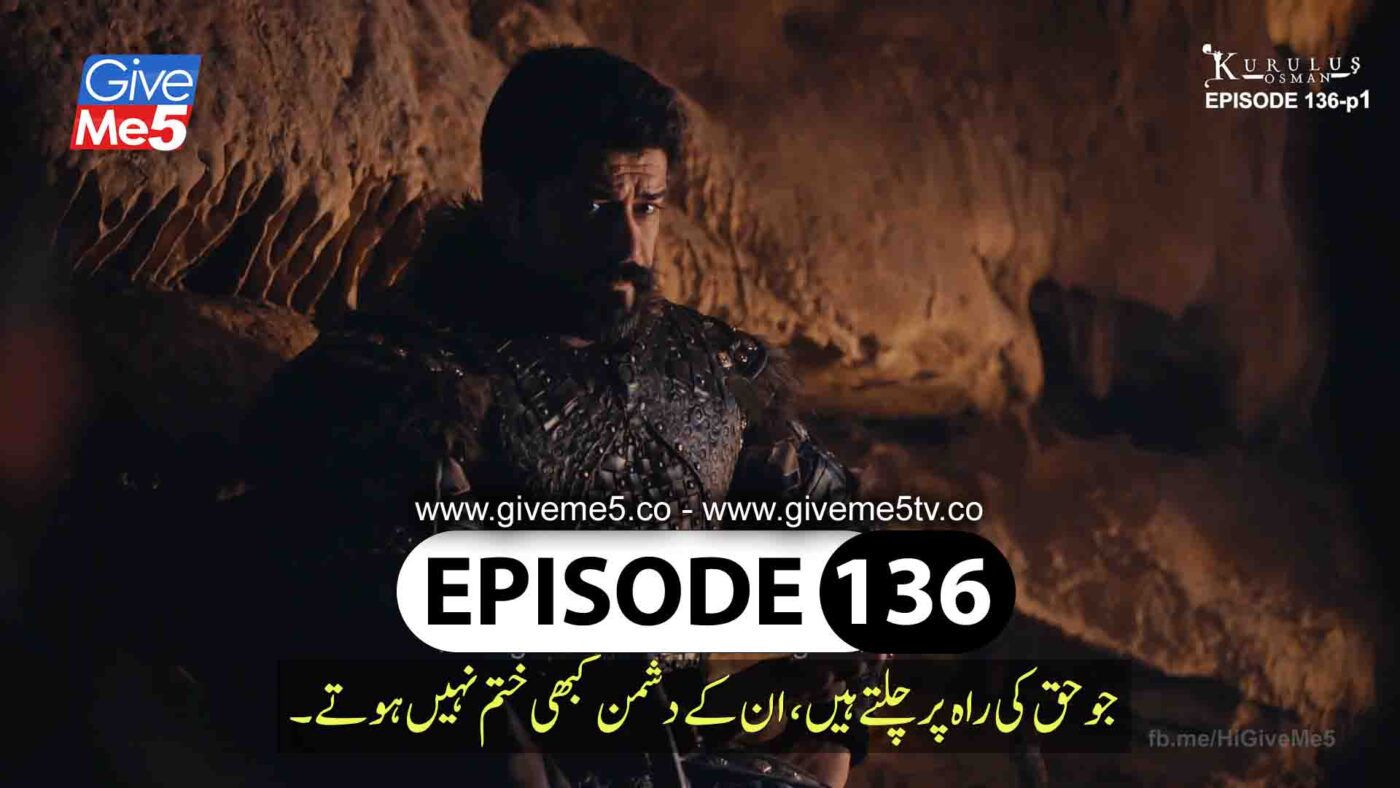This is Episode No 136(06) of Kurulus Osman and Episode No 06 of Season 5 of Kurulus Osman with Urdu Subtitles by GiveMe5. The emergence of the Ottoman Empire, one of the most influential and enduring empires in history, finds its roots in the life and times of Osman Bey, the founder of the Ottoman dynasty. His journey unfolded against a backdrop of geopolitical complexities, with interactions and conflicts with various neighboring powers, including the Mongols, playing a pivotal role in shaping the destiny of the nascent Ottoman state.
Osman Bey, born in 1258, was the son of Ertuğrul Bey, the leader of the Kayı tribe, a prominent faction within the larger Turkic tribal confederation. The region was characterized by a complex web of tribal dynamics, where Turkic tribes coexisted with Mongol influences stemming from the Mongol invasions and the subsequent establishment of the Ilkhanate in Anatolia.
During Osman’s early years, the Mongols, led by Genghis Khan and later his descendants, had swept across vast expanses of Asia and the Middle East, creating one of the largest contiguous empires in history. The aftermath of Mongol rule in Anatolia manifested through the establishment of the Ilkhanate, a Mongol state that wielded influence over the region. This Mongol presence significantly shaped the political landscape in which Osman Bey navigated.
The relationship between the nascent Ottoman state and the Mongols was multifaceted. On one hand, the Mongol dominance created a power vacuum that allowed Osman to expand his influence. On the other hand, it posed a constant challenge as the Mongols sought to maintain control over the Anatolian territories. Osman skillfully exploited the shifting dynamics of the time, capitalizing on the weakened Seljuk Sultanate and the fragmented nature of Mongol rule.
Osman’s strategic brilliance became evident as he carved out a semi-autonomous principality in northwest Anatolia, gradually expanding his territories through a series of military conquests. The Battle of Bapheus in 1302 marked a significant turning point, where Osman’s forces, in alliance with other Anatolian principalities, dealt a decisive blow to the Mongols, asserting a degree of independence for the emerging Ottoman state.
The relationship between Osman Bey and the Mongols was not solely defined by conflict. Diplomatic engagements and alliances were also part of the intricate dance of power in the region. Osman strategically formed alliances with neighboring powers, including the Mongols when expedient, while maintaining a delicate balance to preserve the autonomy of his growing state.
Osman’s successors, particularly his son Orhan, continued to navigate the complexities of Mongol-Ottoman relations. The pivotal Battle of Bursa in 1326, where the Ottomans decisively defeated the Ilkhanate, solidified the Ottoman grip on Anatolia and marked the beginning of the Ottoman expansion into the Balkans.
The Mongol influence, while significant in shaping the early stages of the Ottoman state, gradually waned as internal conflicts and power struggles within the Mongol Empire diverted their attention away from Anatolia. The decline of the Ilkhanate and the subsequent fragmentation of Mongol power allowed the Ottomans to consolidate their rule and emerge as a dominant force in the region.
The legacy of Osman Bey and his adept management of Mongol dynamics reverberated through the centuries, laying the foundations for the Ottoman Empire’s ascent to greatness. The Ottomans, with a blend of military prowess, strategic alliances, and administrative innovations, went on to become a formidable imperial power that spanned three continents and endured for over six centuries.
In conclusion, Osman Bey’s interactions with the Mongols were instrumental in shaping the early trajectory of the Ottoman state. His ability to navigate the complex geopolitical landscape, forging alliances when advantageous and engaging in military campaigns when necessary, played a crucial role in establishing the Ottoman Empire as a dominant force in the region. The confluence of Mongol influence and Ottoman ambition during Osman’s time laid the groundwork for an empire that would leave an indelible mark on world history.
Osman Bey’s astute leadership not only secured the Ottoman foothold in Anatolia but also established a template for subsequent Ottoman rulers. The strategic lessons learned from encounters with the Mongols, a once-dominant force, allowed the Ottomans to adapt and evolve.
The Ottoman Empire, characterized by cultural pluralism and administrative innovations, assimilated diverse influences from its encounters with the Mongols. This historical confluence not only defined the Ottoman state’s formative years but also contributed to the empire’s resilience, enabling it to withstand challenges and endure as a powerhouse that shaped the course of world history for centuries to come.
=
Osman Bey’s legacy extends beyond military triumphs, encapsulating the Ottoman ethos of inclusivity. The Ottoman Empire, emerging from the crucible of Mongol interactions, absorbed cultural and administrative facets that enriched its identity. Osman’s approach to governance, influenced by encounters with the Mongols, fostered a system where diverse communities coexisted, contributing to the empire’s cultural mosaic. The Ottoman Millet system, a testament to this inclusivity, allowed various religious and ethnic groups considerable autonomy within the empire, providing stability and prosperity.
Furthermore, the Ottoman Empire’s administrative machinery, honed through pragmatic engagements with the Mongols, showcased remarkable adaptability. Borrowing elements from Mongol administrative practices, the Ottomans established a centralized bureaucracy, the Devshirme system for military recruitment, and a flexible taxation system. These innovations not only streamlined governance but also contributed to the longevity and efficiency of the Ottoman state.
Osman Bey’s diplomatic finesse during Mongol encounters became a cornerstone of Ottoman foreign policy. While navigating the intricate geopolitical landscape, subsequent Ottoman leaders skillfully maintained a delicate equilibrium between alliances and conflicts. The empire’s resilience, forged through strategic lessons drawn from Mongol interactions, allowed it to weather external pressures and internal challenges, cementing its status as a formidable force on the global stage. Osman’s foresight and adaptability, born from the complex dance with the Mongols, set the stage for an enduring empire that left an indelible mark on the pages of history.

